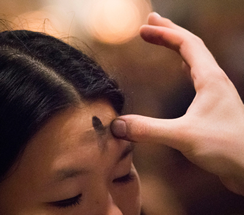Keeping Connected
POSTED: February 1, 2024
L e n t e n b l e s s i n g s . . .
 Seems like we just packed away the creche and swept up the last drooping leaves of the poinsettias (and don’t you and your parish staff just love it when Christmas Eve falls on a Sunday?), and here it is, Lent already — with Ash Wednesday falling on Valentine’s Day, no less (good luck with that).
Seems like we just packed away the creche and swept up the last drooping leaves of the poinsettias (and don’t you and your parish staff just love it when Christmas Eve falls on a Sunday?), and here it is, Lent already — with Ash Wednesday falling on Valentine’s Day, no less (good luck with that).
So take a deep breath, pour yourself a drink, put your feet up and take a couple of minutes to join the conversation.
For those new to Connections, Keeping CONNECTED is a newsletter we send along every so often with information and insights on the ministry of preaching and communications, along with the latest news about what we’re up to here at Connections. This being a conversation, we welcome your participation — send your comments, suggestions and criticisms to us at the terrestrial and digital contacts below.
The art of “illuminating” listening
New York Times columnist David Brooks is known for his “center-right” commentary on politics – but of late, Brooks has focused on moral and ethical issues as well as the sociological constructs that make us who we are.
In his new book, How to Know a Person: The Art of Seeing Others Deeply and Being Deeply Seen, Brooks writes about the human need “to connect . . . to have another person look into [our] faces with love and acceptance” (an essay from the book was published last fall in The Times).
Pastoral ministers and homilists, take note:
As a journalist, Brooks writes, “I often find myself interviewing people who tell me they feel unseen and disrespected: Black people feeling that the systemic inequities that afflict their daily experiences are not understood by whites, people who live in rural areas feeling they are overlooked by coastal elites, people across political divides staring at one another with angry incomprehension, depressed young people who feel misunderstood by their parents and everyone else, husbands and wives who realize that the person who should know them best actually has no clue about who they are.”
Not only journalists, but we ministers need to develop our skills at engaging members of our communities by asking thoughtful questions — and listening to the answers, with empathy and without judgment.
“I’ve noticed along the way that some people are much better at seeing people than others are,” Brooks notes. “In any collection of humans, there are diminishers and there are illuminators. Diminishers are so into themselves, they make others feel insignificant. They stereotype and label. If they learn one thing about you, they proceed to make a series of assumptions about who you must be.
“Illuminators, on the other hand, have a persistent curiosity about other people. They have been trained or have trained themselves in the craft of understanding others. They know how to ask the right questions at the right times — so that they can see things, at least a bit, from another’s point of view.
Such “illumination” is a matter of asking people the right questions. Among the practical suggestions Brooks offers is to “storify whenever possible.”
“I no longer ask people: What do you think about that? Instead, I ask: How did you come to believe that? That gets them talking about the people and experiences that shaped their values. People are much more revealing and personal when they are telling stories. And the conversation is going to be warmer and more fun.”
A second skill Brooks seeks to develop: “the gift of attention.”
Putting aside our perceived status and authority to give his full attention to others, Brooks explains, “I tend to ask them where they grew up. People are at their best when talking about their childhoods. Or I ask where they got their names. That gets them talking about their families and ethnic backgrounds . . .
“After you’ve established trust with a person, it’s great to ask 30,000-foot questions, ones that lift people out of their daily vantage points and help them see themselves from above. These are questions like: What crossroads are you at? Most people are in the middle of some life transition; this question encourages them to step back and describe theirs.”
Pope Francis often speaks of ministry as “accompanying” those we serve. David Brooks’ new book gives us some great tools for such meaningful accompaniment. Brooks’ evokes the wisdom of Saint Benedict: If we’re going to “connect” with folks today in our preaching and ministry, we need to listen to them with the “ear of the heart.”
Connections for the Weekdays of Lent 2024
 This spring, we've assembled a collection of 40 concise, to-the-point homilies — each one approximately one to two minutes in length — for every weekday of the 2024 Lenten season.
This spring, we've assembled a collection of 40 concise, to-the-point homilies — each one approximately one to two minutes in length — for every weekday of the 2024 Lenten season.
Connections for the Weekdays of Lent 2024 is now available. The stories and meditations reflect the themes of the Gospel readings in the Lenten lectionary, beginning with Ash Wednesday, February 14. Also included in this special issue are reflections for the Easter Triduum: Holy Thursday (March 28), Good Friday (March 29), and the Easter Vigil (March 30).
The Connections Lenten issue is available in TWO formats:
the DIGITAL version (sent via e-mail, as a PDF file) at $34;
the “PAPER” version (mailed via USPS) at $40 (Canadian and overseas orders: $43 US).
If you preach — or have always intended to preach — at weekday liturgies during Lent, this special edition of Connections will prove to be a valuable resource.
To order, return the form below with you check or money order to:
Connections for the Weekdays of Lent 2024, 7 Belgian Way, Londonderry, N.H. 03053
Enclosed is my check/money order for $_________. Please send me ___ copy[-ies]
of the Connections 2024 Lenten Weekday issue in the (CHECK ONE:)
[ ] PDF format [ ] paper format.
NAME: _____________________________________________________________________
PARISH/ORGANIZATION: ______________________________________________________
ADDRESS: __________________________________________________________________
CITY/STATE/POSTAL CODE: ____________________________________________________
E-MAIL: ____________________________________________________________________
Preaching workshops and retreats
For the most part, the pandemic seems to be in our rear-view mirror. With care (COVID is still very much a reality), dioceses and church groups are again planning workshops and study days in preaching. We’ll be hitting the road to facilitate three such workshops in the year ahead.
If you’re considering a homily training program for the priests and deacons of your diocese, deanery or community, please let us know if we can be of assistance. We can help you develop themes and topics and design program formats, as well as put you in contact with speakers and facilitators. Contact us anytime at the phone number or via the e-mail address below.
Be part of the conversation
Thank you, one and all, for your notes and e-mails with your comments about and suggestions for Connections. Send your questions, suggestions and comments (complimentary and critical) to the address below or e-mail us anytime at jaycormier@comcast.net. Your ideas and experiences are invaluable to us in our planning.
And please “bookmark” or add our website to your “favorites” list — ConnectionsMediaWorks.com. The site includes exegetical notes for each Sunday’s Gospel and stories and reflections we post from past issues Connections. You’ll also find information on our special issues series, details on workshops and retreat programs, and a “notebook” of practical advice for effectively communicating the Word in your homily.
“God so loved the world . . . ”
 The Amen to this edition of Keeping CONNECTED comes from the wisdom of the late Jesuit Father Walter Burghardt, one of the American Church’s outstanding preachers. From his collection of homilies When Christ Meets Christ:
The Amen to this edition of Keeping CONNECTED comes from the wisdom of the late Jesuit Father Walter Burghardt, one of the American Church’s outstanding preachers. From his collection of homilies When Christ Meets Christ:
“To be alive with Christ means that in the power of his passion you can think and act, live and love, more fantastically than in your wildest dreams. You can believe what passes belief: accept God’s word for the incredible Creed you repeat so facilely each Sunday. You can hope for what seems hopeless: confidently expect that God will be with you wherever you are in this life, with you days without end in the next. You can love as you’ve never loved before, as Christ has loved you: love without looking for what you can get out of it, love those you don’t like, love the outcasts of your world, love when it costs you, even unto crucifixion . . .
“Good friends: The passion of Christ did not end on the first Good Friday. The passion of Christ surrounds you, chokes you: every human wasted in the womb; every third black child languishing below the poverty line; the thousands of women savaged by men vowed to love and honor; the homeless on your streets rummaging for food in garbage cans; the racism that lurks just below our civilized surface. The death that envelopes us . . . lays a heavy demand on us who share a risen life given us freely from a cross.
“You and I have been graced indeed, gifted by God beyond our deserving. But, as Protestant martyr Dietrich Bonhoeffer saw in World War II, grace that comes cheap, grace that keeps us ever so comfortable, will never redeem this sin-scarred earth. Only costly grace can do that; only men and women like yourselves who find in this Eucharist the power to repeat in their own persons, This is my body . . . given for you. Given for Christ, given for the crucified images of Christ. It’s a great way to come alive . . . alive in Christ.”
May our Holy Week journeys with our worshiping communities this Lent lead us to such “costly” grace – the grace that can redeem our broken world.
Jay Cormier
POSTED: September 9, 2023
 A u t u m n b l e s s i n g s . . . !
A u t u m n b l e s s i n g s . . . !
It’s been quite a summer, to say the least. Most of the country has been an oven of unrelenting heat. Here in New England, it was monsoon season, with weeks of airless humidity and tropical downpours resulting in devastating flooding. Is this the new and future summer season in America? Here’s hoping the coming autumn is a season of peace and cooler and drier weather as another program year amps up.
Welcome to this latest installment of Keeping CONNECTED, our now-and-then epistle on best practices in preaching and new ideas in communications for church communities. We invite your participation in the conversation — send your comments and ideas to us at the address (either geographic or digital) below.
Few words, many meanings
The evangelist Matthew is our narrator of the story of Jesus in this Year A of the lectionary cycle. Matthew’s is the Gospel of parables: Jesus preaches in all kinds of stories and images to reveal to his listeners the reality of God’s kingdom. In Liturgical Press’ monthly prayer guide Give Us This Day (full disclosure: your humble scribe is a contributor to Give Us This Day), retreat master and author Cistercian Father Michael Casey reflects on Jesus’ use of parables as a strategy of communications
“Stories, images, and symbols do more than simply inject factual information into our heads. They ask us to ponder the matter, to chew it over, to ruminate on the basis of our own experience of life. To spend time with the image and allow ourselves to pause in wonder.”
Yes, some would prefer that Jesus would have spoken in plain language, defining the legalities of God’s law with black-and-white clarity. But as many preachers come to realize, stories centered in the lives of their hearers enable them to recognize that love of God in their own everyday experiences. In parables and images from our Monday-through-Saturday lives, we are able to see and hear the Spirit of God at work in our anything-but-black-and-white complex lives.
Again, Father Casey:
“Jesus spoke in parables out of respect for his listeners. He left it to the Pharisees to lay down the law. He preferred rather to initiate a process of reflection that would allow his disciples to arrive at the fullness of truth not by marching along a highway but by following a meandering path that was more expressive of the complexity of individual lives. Direct apprehension of the whole and perfect pure prayer are for eternity. For now, prayer comes marked by the untidiness of daily life, but yet is confident of its acceptability in the Father’s eyes.”
May we possess the wisdom of Jesus who preached in parables: keep it real, however “untidy.”
[From “Few Words, Many Meanings” by Father Michael Casey, from Give Us This Day, May 2018, www.giveusthisday.org (Collegeville, Minn.: Liturgical Press, 2018). Used with permission.]
 “The feeling I no longer pray for . . . ”
“The feeling I no longer pray for . . . ”
In teaching college students, I’ve had many conversations with them about what role faith plays in their lives as they cross the threshold from child to adult.
The short answer: Not much.
What I sense from this admittedly anecdotal evidence is that religion and spirituality are considered vestiges of childhood. Church is left behind as they move from the teen years to the responsibilities of young adulthood. The religious practices they learned in school are consigned to the attic of childhood memories.
Kids simply “outgrow” God.
And yet, many of my students will give of their time to any number of community service projects; they seek to live their lives with moral and ethical integrity; they are loving and caring young men and women who are deeply concerned about the future of our planet and issues affecting the common good. We as a church are missing something here: providing young adults with an “adult” experience of God and a “mature” perspective of faith.
That’s why an essay by Debie Thomas in the December 2022 issue of The Christian Century resonated with me. Thomas is minister of lifelong formation at St. Mark’s Episcopal Church in Palo Alto, California. Author of Into the Mess and Other Jesus Stories, she’s a regular contributor to The Christian Century; her wisdom and insight have also appeared in Connections.
Debie Thomas writes about leaving the faith tradition of her childhood because, as she grew up, “I didn’t feel what I was supposed to feel. At least, not often, and not in ways I could depend on. Though I prayed fervently for felt experiences of God, such experiences by and large eluded me . . . Predictably, this led to guilt, shame, doubt and jealousy. Surely, I thought, I was doing something wrong. Surely I didn’t have enough faith.”
But over time, Thomas came to a bigger understanding of God.
“What I’ve learned in recent years is to change my default setting from divine absence to divine presence — to assume that every experience I have is a spiritual one. After all, if God is wholly other; if God is not a bigger, stronger, smarter version of me; if God infuses and simultaneously transcends all that exits – then what does it mean to feel God? If God is not a being among other beings but instead the ground of all being, how does my understanding of spiritual experience have to expand . . . ?”
One solution, Debie Thomas suggests, is to stop “compartmentalizing our lives, walling God off in some arenas we consider too secular and ordinary. Most of us have an easy time perceiving God in our gratitude, our awe, our reverence, our delight. But what if God is just as present in our boredom, our irritation, our hunger, and our fury? What if God dwells as richly in the laundry room, the cafeteria, the schoolyard, and the boardroom as God does in the pews, the sermon, the chalice, and the baptismal font?
“There is nowhere I can go where God is not. There is no experience I can have apart from the one in whom I live and move and have my being. I don’t need to beg God to make my everyday experiences spiritual; I am already surrounded, held, infused, and animated by the God who made me.”
I wonder if this is the biggest challenge facing faith formation in 2023: providing young Catholic Christians with a perspective of the holy that is integrated with the challenge of being an adult disciple of Jesus, to help one another “see” God in the ordinary joys and sorrows, surprises and messes of life — adult life.
How the wise get Connections . . .
When we began offering Connections via e-mail, we never thought we’d lived to see this: two thirds of our subscribers now receive the digital version of Connections instead of the “paper” newsletter.
We urge you to consider switching to the e-mail edition of Connections. You’ll save time, money and not a few trees by transferring your subscription to the e-mail version. E-mail subscribers receive the new issue up to two weeks earlier than those who wait for the overland mail version (and we can replace missing issues immediately). With the costs of printing and mailing a paper newsletter continuing to escalate, we happily pass the savings of e-mailing along to you. Just drop us a note or e-mail and we’ll put you on the e-mail list.
Preaching workshops and retreats
Seems that we Church folks have just about fully emerged from our pandemic-enforced cocoons to come together for community prayer and study. We’ve gotten more and more inquiries from groups seeking to relaunch retreat experiences and ministry study days.
If you’re considering a preaching retreat/study day or are in the planning stages of a homily training program in the year ahead for the priests and deacons of your diocese, deanery or community, please let us know if we can be of assistance. We can help you develop themes and topics and design program formats, as well as put you in contact with speakers and facilitators. Contact us anytime at our office (603/432-656) or via e-mail (jaycormier@comcast.net).
Stay plugged into the conversation . . .
Thank you, one and all, for your notes and e-mails with your suggestions for and comments about Connections — they’re invaluable in our planning. We’re especially gratified (and humbled) by the many kind and complimentary notes subscribers write on their renewal cards and forms.
Send your questions, comments and suggestions to the address below or e-mail us anytime at jaycormier@comcast.net. And please “bookmark” or add our website to your “favorites” list. We regularly post new resources for homilists — and, as we continue to discover, many catechists and RCIA team members find the site helpful, as well.
The site includes exegetical notes for each Sunday’s Gospel and stories and reflections we post from past issues Connections. You’ll also find information on our special issues series, information on workshops and retreat programs, and practical advice for effectively communicating the Word in your homily.
Visit our website anytime — and let us know how we can make it more helpful to you.
 A Thanksgiving chant
A Thanksgiving chant
Finally, I clipped this to put in my “good stuff” file for Keeping CONNECTED: a prayer from the Buddhist tradition chanted at daybreak in gratitude for the blessings of life. With gratitude to the editors of Spirituality & Health (March/April 2021), we include it here as we anticipate the season of Thanksgiving:
With gratitude I remember the people, animals, plants, insects, creatures of the sky and sea, air and water, fire and earth, all whose joyful exertion blesses my life every day.
With gratitude, I remember the care and labor of a thousand generations of elders and ancestors who came before me.
I offer my gratitude for the safety and wellbeing I have been given.
I offer my gratitude for the blessing of the earth I have been given.
I offer my gratitude for the measure of health I have been given.
I offer my gratitude for the family and friends I have been given.
I offer my gratitude for the community I have been given.
I offer my gratitude for the teachings and lessons I have been given.
I offer my gratitude for the life I have been given.
May we realize each morning all that we have to be grateful for, the blessings of God’s goodness that we have been given . . .
Jay Cormier
